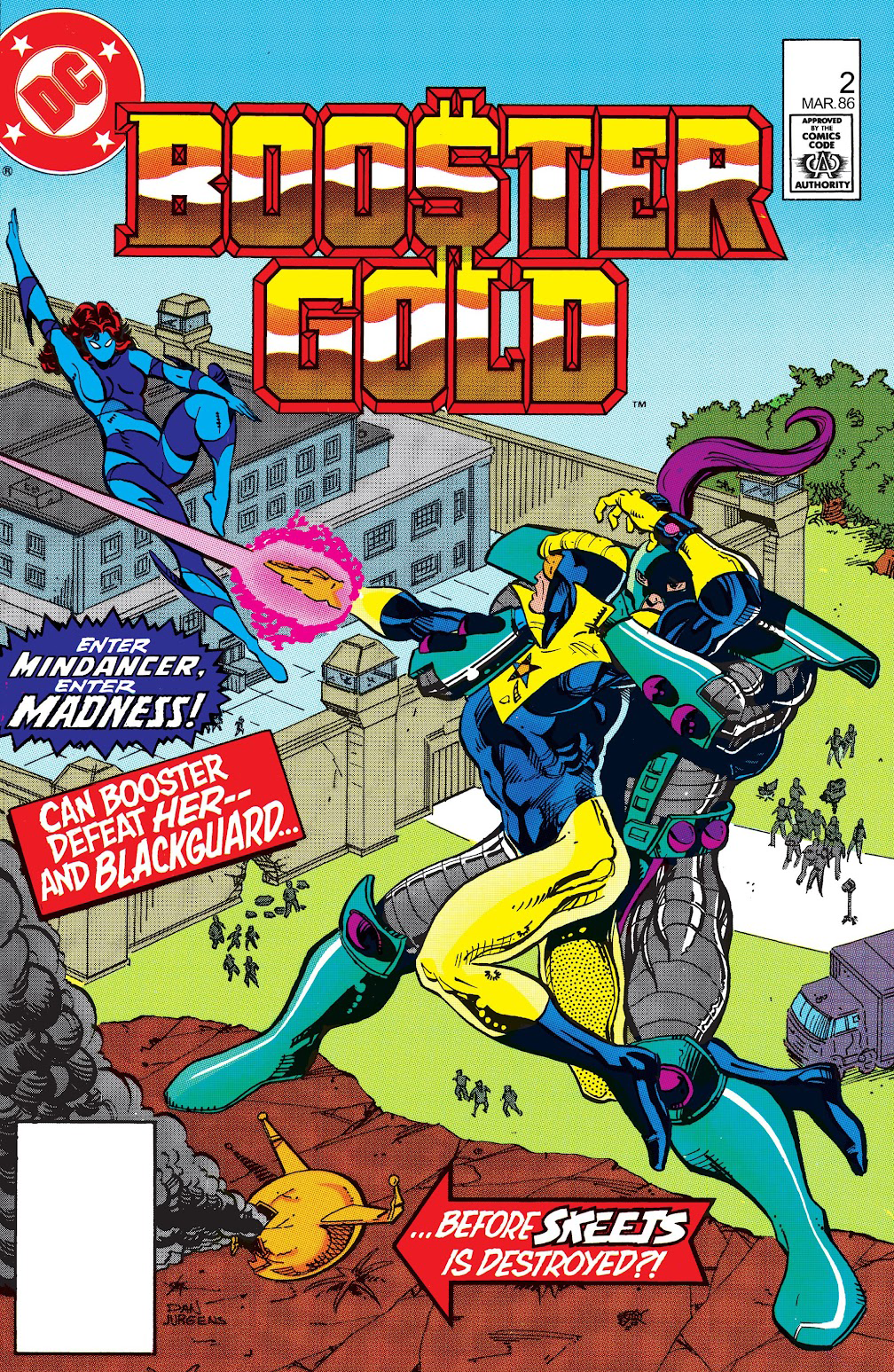Bulletpoints
This issue is good if you like:
A cover you normally only see drawn with a nubile damsel in distress as the subject
Laughing so hard that you wheeze both at the cover and at the opener
Conversely, having the urge to wrap Booster in soft blankets at least once
That’s not actually a joke
A heckin’ entertaining issue pretty much from start to finish
Less sexism, thank everything
Skeets. Booster being awkwardly adorable. A nail-biting cliffhanger
This issue sucks if you’re looking for:
-sigh- Still any escape from Booster’s name or branding
Any room for the story to breathe; it’s breakneck in its pacing
Any escape from it being the eighties. (Last time to mention this, it’s a given.)
The Tally So Far
Urge to Slap Booster Silly: 4
Urge to Coo Over Booster: 3
Give Skeets a Medal: 3
Give Trixie a Medal: 3
We’re gonna go ahead and add two more running counts because as you read this book, you’ll realize just how prevalent the first one is, starting with this cover 3:
Booster in Bondage: 1
And the second one because it also happens a lot:
Urge to Wrap Booster in Soft Blankets: 0 now, but that changes very quickly starting with this issue.
Subversive Blonds
Before I get into the heart of this review, I do have to start with that cover.
One thing that’s incredibly prevalent in comic books is the ubiquitous ‘sexy’ posing of women — superhero or civilian — on covers. Or in the pages. Or everywhere. It’s gotten better over the years, with fewer broken spines, impossible waists, and the weird necessity to show both breasts and asses at wildly unlikely angles, but it’s still something that is so well-known that I’m sure there have been whole essays written about it.
That being said— there are a few but notable interesting subversions to this. One of them is Dick Grayson, of course. But another is actually another gorgeous blond guy: Steve Trevor, who has regularly been depicted in bondage himself — from his earliest days! — and who was always intended to be secondary to Diana, often finding himself being rescued by her, even to the point of being slung over her shoulder like a very well-shaped sack of potatoes.
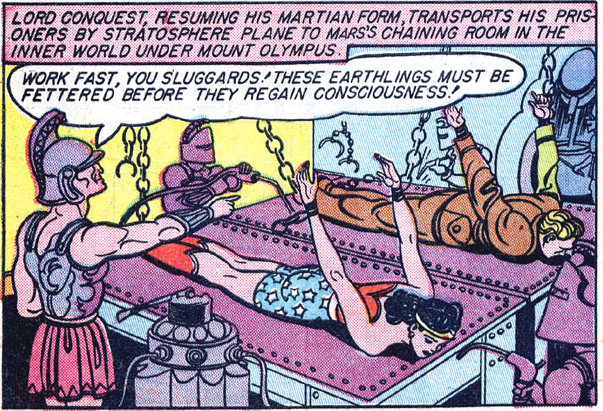
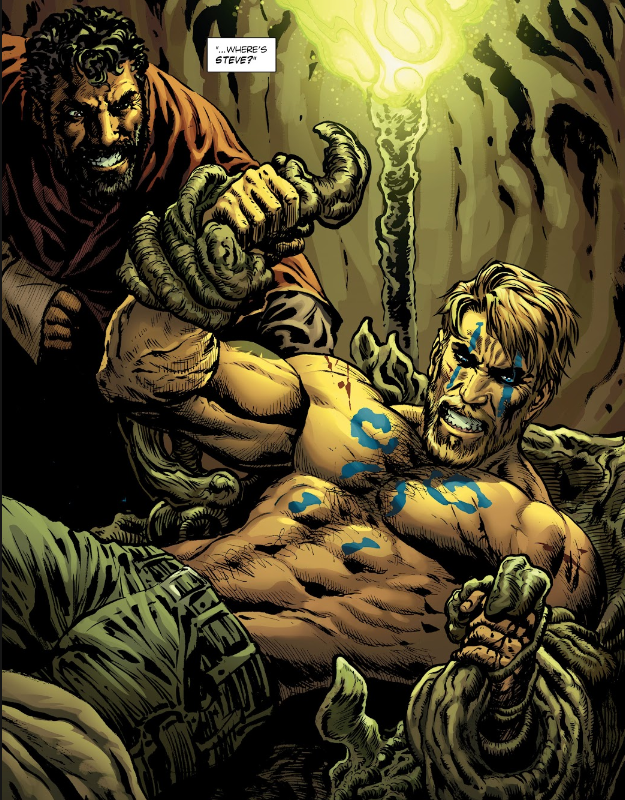
The thing that makes Steve subversive is that he is second fiddle to Diana and often intended to be eye-candy; he’s intended to appeal to something other than what the traditional male super hero does. He’s a classical male hero in every possible sense of the word himself — brave, strong, handsome, undeniably masculine — but instead of headlining the book, Steve’s Diana’s hype-man. He’s not only not threatened by her being stronger and more famous than him, he’s proud of her for it. He’s vulnerable often, physically and otherwise. When handled correctly, he’s an incredibly good example of non-toxic masculinity and he’s one of my favorite characters because of it.
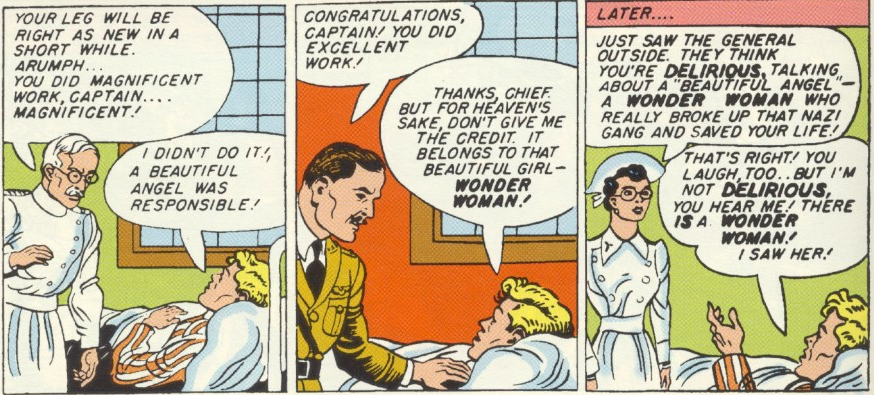
That’s not to say Steve never acts as mouthpiece to the patriarchy; it is to say that when he’s being written in the spirit he was created, it’s incredibly rare and it’s made very clear in the narrative and dialogue that he’s in the wrong. A number of writers after the death of William Moulton Marston have gotten him wrong, but it’s established meta-text that they really are getting it wrong, that they are ignoring his purpose; that it’s a writing failure, rather than a concept failure.
Now— how does this relate to Booster?
Well, I’d argue that Booster’s also a highly subversive character and not (just) because of his commercializing ways! While Booster’s fame-chasing was definitely unique for the time, especially in a world with such wholesome, Middle American heroes as Superman, Booster himself seems to be both written and drawn similarly in some ways to Steve. He’s meant to be looked at and admired physically, he’s drawn as an unselfconscious beauty and often posed to draw attention to that, which is decidedly different from the typical male power fantasy, especially in that era. And he also spends a fair amount of time in some form of bondage, or made vulnerable, and I’d argue noticeably more than the average male superhero.
There are obvious differences between Booster and Steve: Booster’s his own headliner, while Steve’s under Diana’s banner, for one. But in terms of the subversiveness—
Booster’s drawn, it often seems, for the eyes of the other. Whether the other is female, queer (closeted or not) or hell, maybe just kinda kinky. In this example of a cover: Drawn with a body position much more reminiscent of a female character while being physically restrained from behind by a much bigger, beefier dude. I mean— 😳
I actually did end up e-mailing Dan Jurgens after writing most of this section because I wanted to know if that was intentional and he was the only one who could tell me. (Booster being depicted as beautiful, I mean; I did not ask him about the common use of bondage or the homoeroticism of this cover, however, because like— you just don’t do that, man. 🤣 So, don’t panic.) But I wanted to ask about that subversion of the traditional heterosexual male power fantasy with a character who still comes across as wholly masculine and yet — exactly like Steve Trevor — of a non-toxic variety.
At that point, anyway. Later, unfortunately, is another story for both men.
I explained my thinking with regards to Booster being depicted as I’ve already laid out here — as a beautiful guy with said beauty intentionally highlighted, versus as a male power fantasy — and then asked specifically:
I guess my question is: How intentional was that subversion? Was it intentional at all, or did Booster just turn out that way? And if it was intentional, what was the thought process there?
ANYWAY! Dan actually liked that line of questioning and replied in a very sweet manner that made me smile. According to him:
“Remember as well that Booster was going to be a spokesperson appearing in ads and commercials. He was to have a high ‘Q’ rating as well. So, with all of that in mind, I took him in the direction you described. (He was also to be a bit awkward and naive, and that tends to go with youth.)”
I had figured that was part of the reason for that, especially given the glamor of that era in advertisement, but having it confirmed by ‘word of god’ is a delight, I have to admit. And Booster’s awkwardness and naïveté are both things I’ve noted prior and find desperately charming about him, so having that also brought up unsolicited made me happy.
A whole lot of people who skim his book or know of him peripherally only really notice the bright surface for good or ill, but even in this first book, the boy had a lot going on underneath said surface; I definitely wouldn’t find him half as fascinating as I do if he didn’t.
The Actual Review
That hopefully interesting and entertaining digression aside—
We left Booster on a cliffhanger last issue (much like we left Ted in his first issue), and in deep trouble. A quick recap via the local television reporter then leads into an introduction that had me absolutely wheezing with laughter the longer I contemplated it:
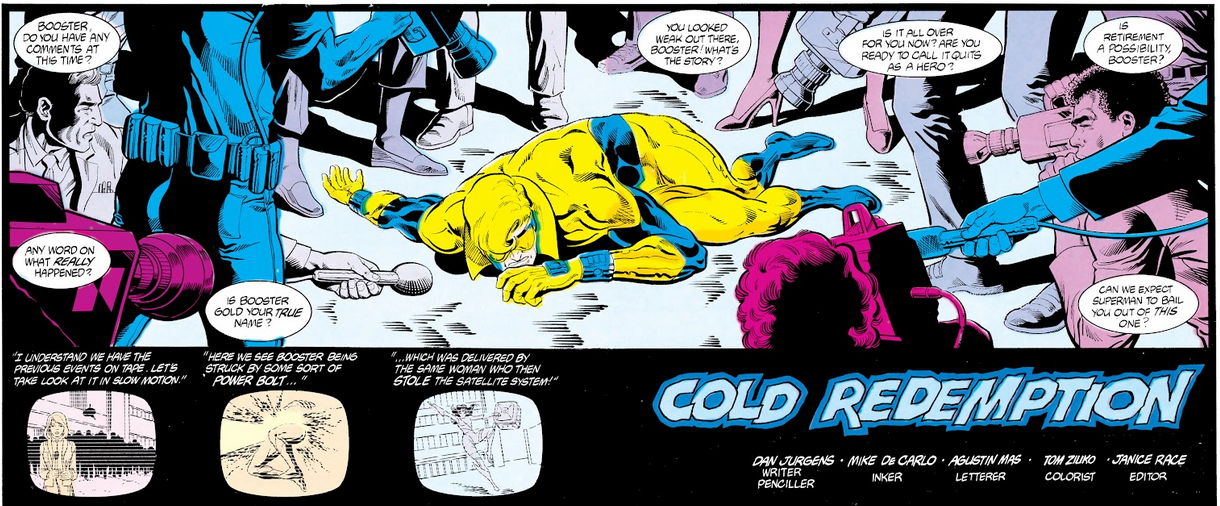

You definitely get the impression that this is Booster’s first serious defeat in this era, given his reaction to it. As outright hilarious as him being the actual embodiment of ‘pathetic wet cat’ is, though, there’s a hell of a lot of meat on the metaphorical bones of this issue in terms of his characterization. Quickly, Skeets is doing as Skeets does — trying to help/protect/parent his Disaster Person — and Booster is proving immediately that he has some major issues with appearing (or for that matter being) vulnerable that seem to go a hell of a lot deeper than just ‘the cameras are on me.’
There’s more to that which I’ll get into later, because it’s a recurring theme with him and one that intrigues me deeply, but for now—
Despite both Skeets and the good Dr. Klyburn trying to give Booster a little breathing room, he still tries to talk to the media, who promptly chews him up and spits him back out on the street he was just really in it now with.
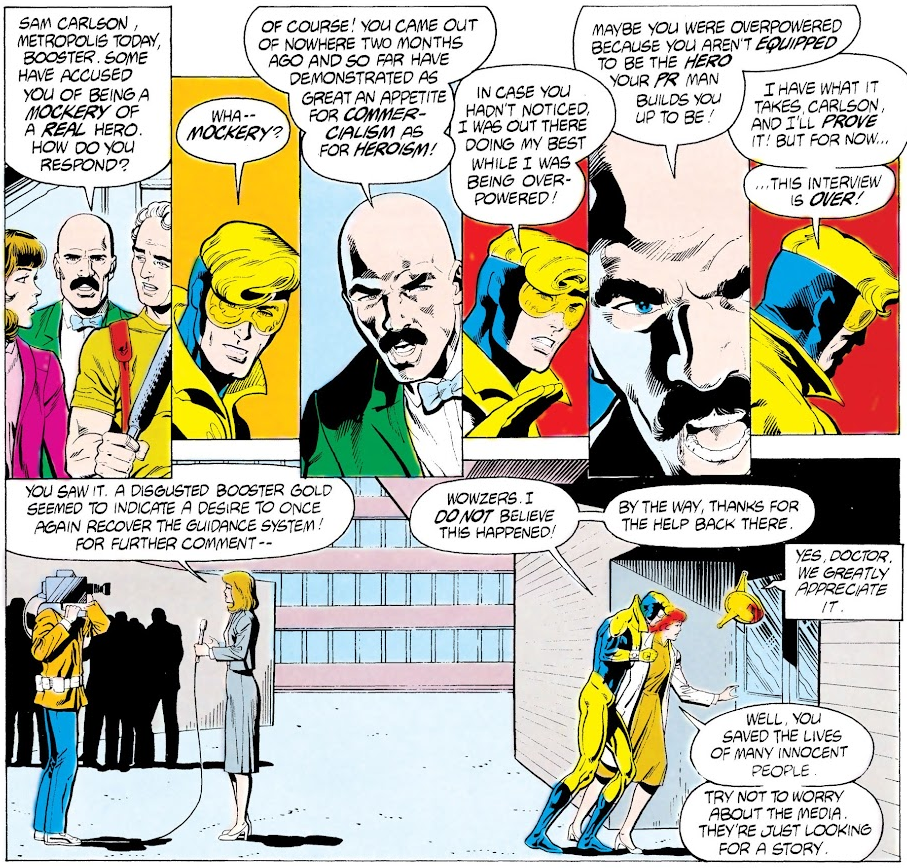
Geez. Only two months ago? The timeline’s all borked, Dan, what’s up with this!
Ignoring the timeline — because Booster’s timeline doesn’t make any actual sense if you take it at face value alone — we take a jaunt over to look in on a fuming Dirk Davis, who’s incredibly pissed off that Booster turned out to be, you know, human— and not only acts like an ass, but makes poor Trixie feel the bad kind of feral.
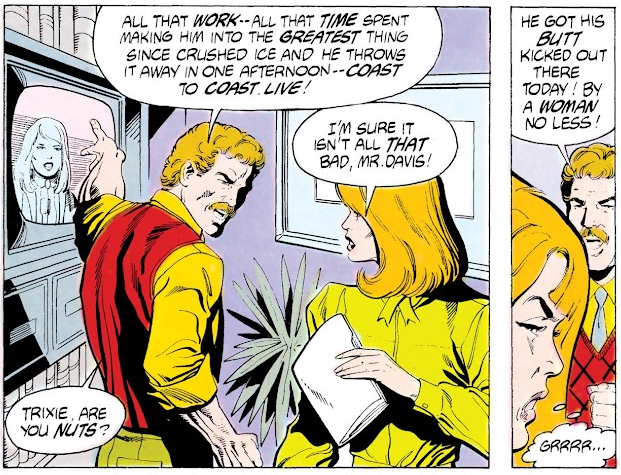
Seriously, though; if you’ve read my reviews of Ted’s book, you’ll see I do compare both secondary casts and how Ted’s is pretty much superior in almost every way, not only in diversity, but also in likeability. You’re clearly not supposed to like Dirk here, though, which is marks in Dan’s favor. As is his deft handling of what happens later.
After a short stint of wanting to rip Dirk’s mustache off bare-handed, we’re over visiting Centennial Park, where apparently a lot of people do a lot of things that they’re supposed to do — from lovin’ to muggin’ — and where our newest villain Mindancer has enough of a mercenary career to get hired by very wealthy people, but unfortunately not enough cash for a second ‘d’ in her name or a costume that a printing press can register correctly.
It’s here we’re introduced to another facet of the various rogues lining up to skin Booster and wear him as a hat: The 1000, starting with a dude named The Director, which also strikes me as very The Eighties. The Director also just— absolutely adds to the wildly kinky themes started on the cover by hiring Mindancer to break Blackguard out of prison because — get this! — ‘he needs to be… disciplined.’
Seriously, in exactly that inflection! That is literally printed on a page!
But speaking of intriguing power dynamics, we head back to Goldstar, Inc. where Trixie’s working late and a downtrodden Booster comes back; while he’s not melted to the street anymore, he’s still channeling some ‘pathetic wet cat’ here, all while Skeets beefs on the actual literal cat.
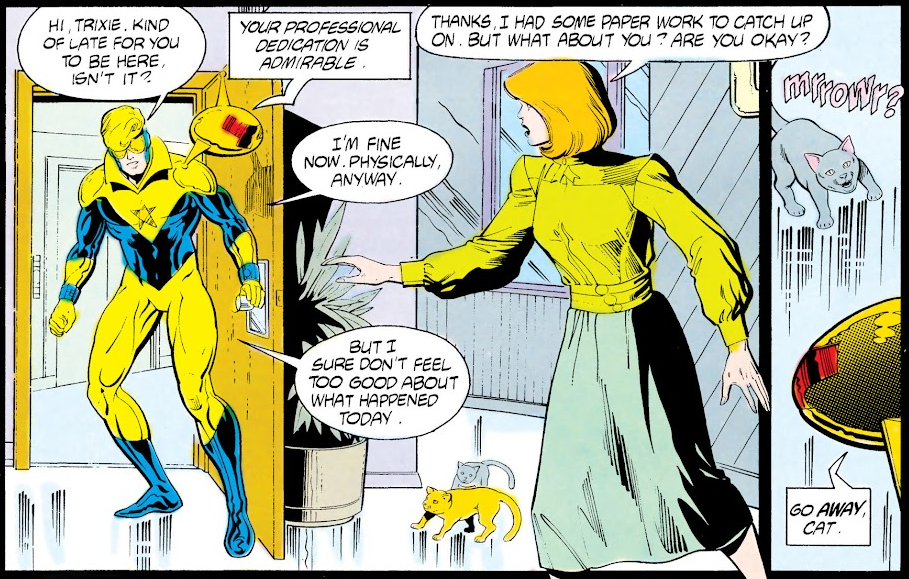
Trixie and Skeets both do their best to pick Booster back up emotionally — add one to Trixie’s medal count (4), but Skeets doesn’t get one here, ‘cause he’s beefing on a cat ffs 💀 — but then here comes Dirk Davis.
And whoooooo boy. My love of this next stuff is on par with my love of that scene in Ted’s book where Mel jumps him in the penthouse for the character work here.
We’ve established that Dirk’s kind of a dickhead. His characterization throughout this book sort of wavers back and forth between mercenary and something more kind, but ultimately, he ends up a bad guy. That being said, I’m absolutely sure Dan wasn’t writing him to be a villain back this early on, just an ass. And his dynamic here with Booster is so damn fascinating.
Okayokayokay. Just— let’s pick this apart, yeah?
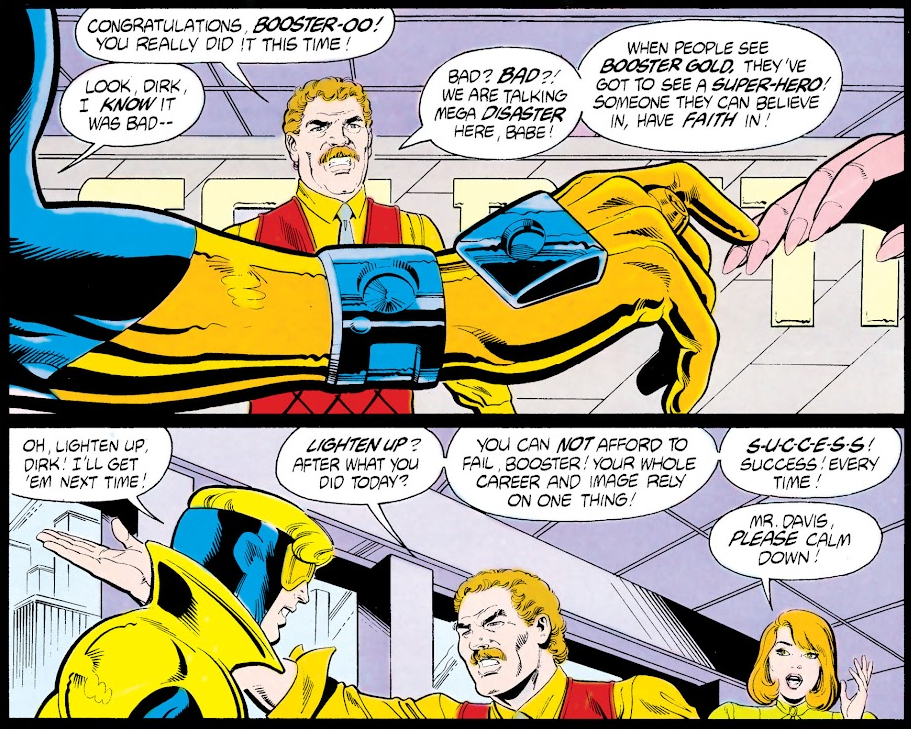
First, Dirk just goes to cut Booster’s knees out from under him with the immediate reminder of who’s (allegedly) in charge; Boosteroo is an adorable kind of nickname, but in this context, it’s absolutely meant to be condescending. And Dirk follows it up immediately by calling him babe too, which — I’m guessing — is another knock on Booster’s age (and not used in the context of a romantic pet name, though you can make some arguments for that as an attempted dominance display, as well).
And Booster reacts— exactly like a kid who had a rough start would, at first. He tries to appease, he tries to defuse the situation, he defers. He doesn’t want a fight. Dirk doesn’t stop there, though:
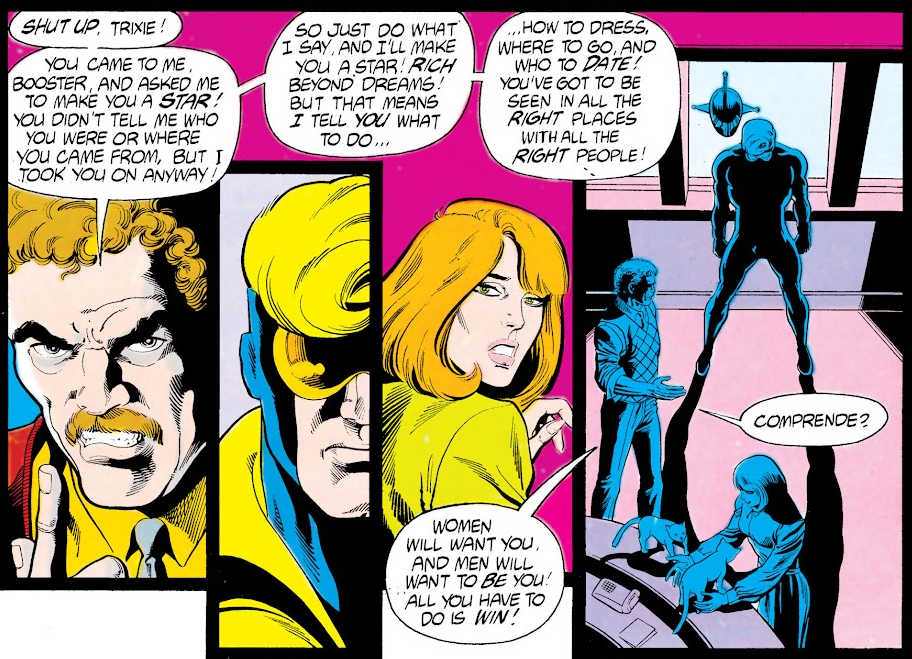
It’s the ‘how to dress, where to go, and who to date!’ that I wanna gnaw on like a bone. Beyond the fact that I personally think Booster reads as distinctly queer 4, there’s something uncomfortable about an older man exerting or attempting to exert that incredible level of control over a kid who’s not even legally old enough to buy a six-pack of beer at this point.
I’m sure that level of control over someone is not actually considered unreasonable in PR circles of the rich and famous. Or, at least, that it wouldn’t have been back then. And Dirk doesn’t know Booster’s background — nor would a reader coming into this book cold — but when you consider it in the context of Booster’s backstory as revealed over time and revision (especially when we get to the blackmailed by the mob part), the uncomfortable implications go off the chart and Booster’s response is just excellent:
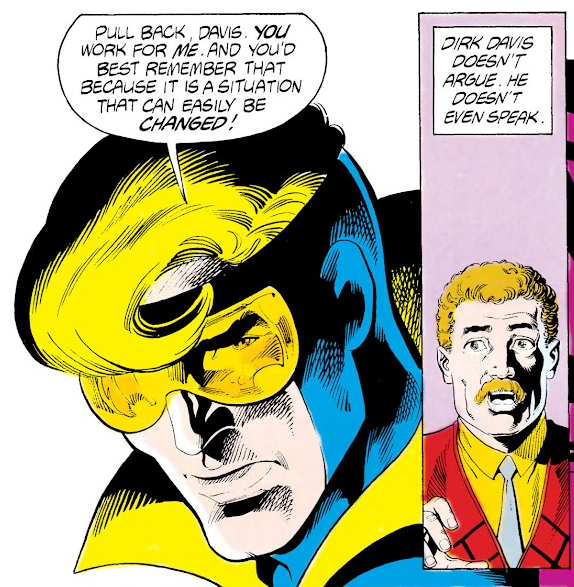
I love that. Because it’s not arrogance. It’s not Booster deserving a swat. Dirk crossed line after line and finally Booster shoved him back to the proper side of them. For a guy who is very bad at boundaries later — as in, bad at enforcing them, though he occasionally fucks up in recognizing and crossing them, too — seeing Booster lay down that line in the sand here is really good.
It leads directly into the next bit, which is one of my favorites for this entire book: The incredibly pointed and poignant illustration of just how young and lost and lonely this kid is. And also how critically important to him Skeets is.
Booster and Skeets head home, still clearly not feeling great. The dialogue between them there hammers the point that Skeets really is half-parenting Booster, and not only that, but that Booster responds to it exactly like someone in desperate need of that style of support would:
Skeets: Booster?
Booster: What?
Skeets: You mustn’t sulk.
Because— Skeets isn’t scolding him here. The tone comes across as incredibly soft. He is telling Booster what to do (or rather what not to do), but unlike Dirk, you have no trouble believing that Skeets is acting from nothing more than a real interest in taking care of this lost kid he’s ended up watching over.
Giffen and DeMatteis didn’t really know what to do with Skeets, so he was sidelined. And in modern books, Skeets generally acts like he probably actually hates Booster, or at least barely only tolerates him, which is a writer’s failure (lookin’ at you specifically, King) to understand the difference between joking and meanness. Because there is a difference.
But here in this first volume (and honestly through to Flashpoint), there’s this level of patience and kindness — this generally unconditional regard — that Skeets offers Booster that literally no one else does. In this first volume, like I said, Skeets is half-parent to Booster; later, in Vol. 2, their dynamic is more mature, though still really familial and one of my favorites. Unlike anyone else here currently, Skeets knows exactly where Booster is from and what happened and why he bolted into the past with an armload of stolen gear; he knows all of that tangled up disaster, just what kind of mess of a person he’s aligned with, and yet while he’d probably deny having the programming, he so obviously loves Booster anyway.
It’s not that Skeets never gets frustrated with Booster, but even when he is, that regard is still apparent. And Booster doesn’t always get it or appreciate it enough here, but then again, most kids kinda don’t at that age; it’s not a case of willful selfishness or self-centrism or anything, it’s just the very typical blind-spot a young person has for a guardian. You don’t really know how to appreciate that patience and sacrifice until you’ve matured more.
From here, they brainstorm a little bit together, trying to figure out where Mindancer took that stolen guidance system, and this excellent set of scenes ends here:
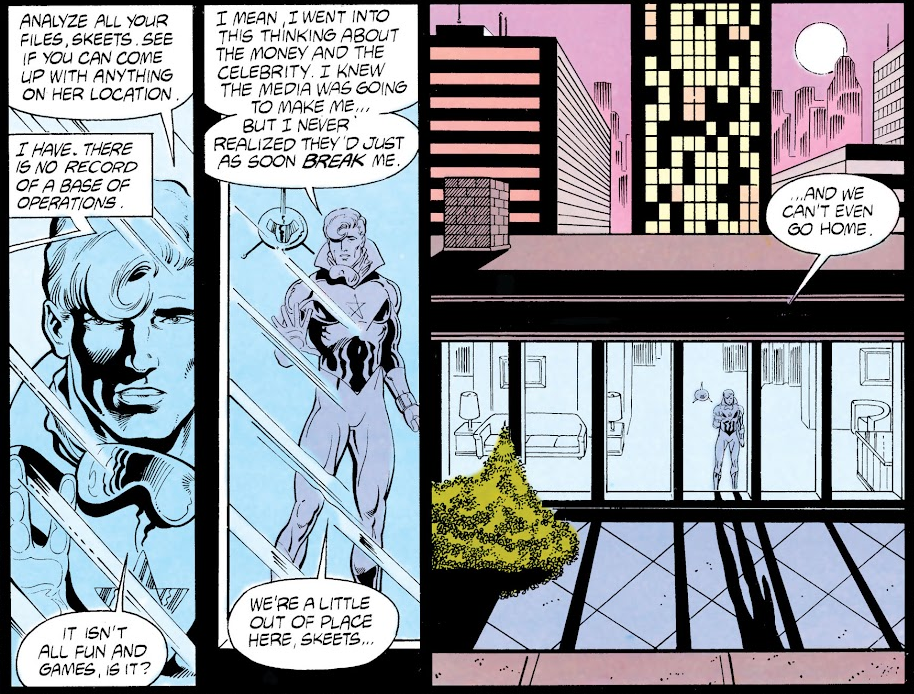
Considering that the media in his own time both made him and snapped him over their collective knee, I’m choosing to think that Booster’s belief that this time is somehow different was purely a function of the naïveté mentioned before, just for a Watsonian take. He wanted it to be different, so he convinced himself that it would be; he wanted to think he’d be able to clean-slate everything and since no one would ever know that he’s a poor, disgraced loser from the bad side of town, he’d be perfectly fine and able to charm everyone with his genuine good looks and likewise genuine charisma.
And then he gets it in the teeth and learns that leaving a blood trail is leaving a blood trail, regardless of what era it is or what’s hunting you.
It’s a kind of understandable, heartaching attempt at wish-fulfillment. It’s exactly the way someone his age would rationalize, too. Dan was smart to point out that Booster actually really does care about being good, about being a hero, in this issue; combined with Skeets gently telling him not to sulk and his reaction and raw vulnerability here, it humanizes him swiftly and sharply and very, very well.
He stops being an attempted icon, a shining, fast-talking self-salesman and becomes just another kid standing in water three inches taller than the top of his head, still trying to figure out how to keep his nose above the surface and not always succeeding.
We leave Booster to his naval-gazing and have a look at a mysterious female shaking down an apparently homeless dude for information about the 1000; from there, we cut to the next day where Booster’s shilling breakfast cereal with a policeman almost as pretty as him on camera:
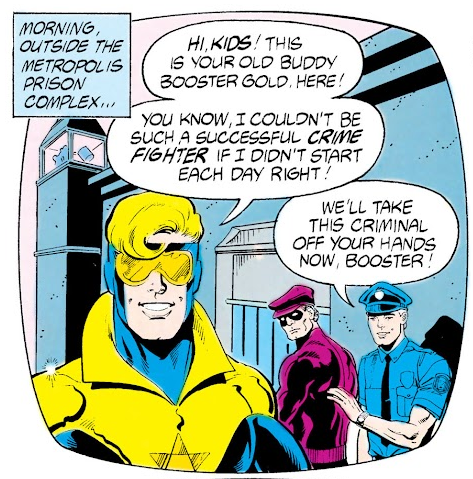
Predictably it’s painful, because Booster doesn’t actually like said cereal or what he’s doing. His pragmatic response to Skeets pointing out that it’s demeaning, though, is that “It pays the bills!” which is actually a perfectly common-sense answer to it. We’re only halfway through this issue, however, and this review is already 3300 words so we’ll try to move it along.
(Booster does briefly skirt sexism by saying the creative director haranguing him is a ‘cold woman’, but I’m also inclined to give him a pass because I’m pretty sure a guy who still gets about three quarters of his idioms wrong would not actually know about the misogyny of referring to any woman with a synonym of ‘frigid’. Mister Jurgens, on the other hand—)
After that, Skip — our comic book editor from last issue — stops by to get the full sleaze from Dirk and the full fanboy from Booster, whose cute enthusiasm at the idea of getting to be a comic book hero (Go go gadget meta! Also, raising the urge to coo over him by 1!) is unfortunately interrupted by a prison break. Because apparently they’re actually filming at an actual prison and not, you know, on a stage somewhere. 🤣 And who should it be…?
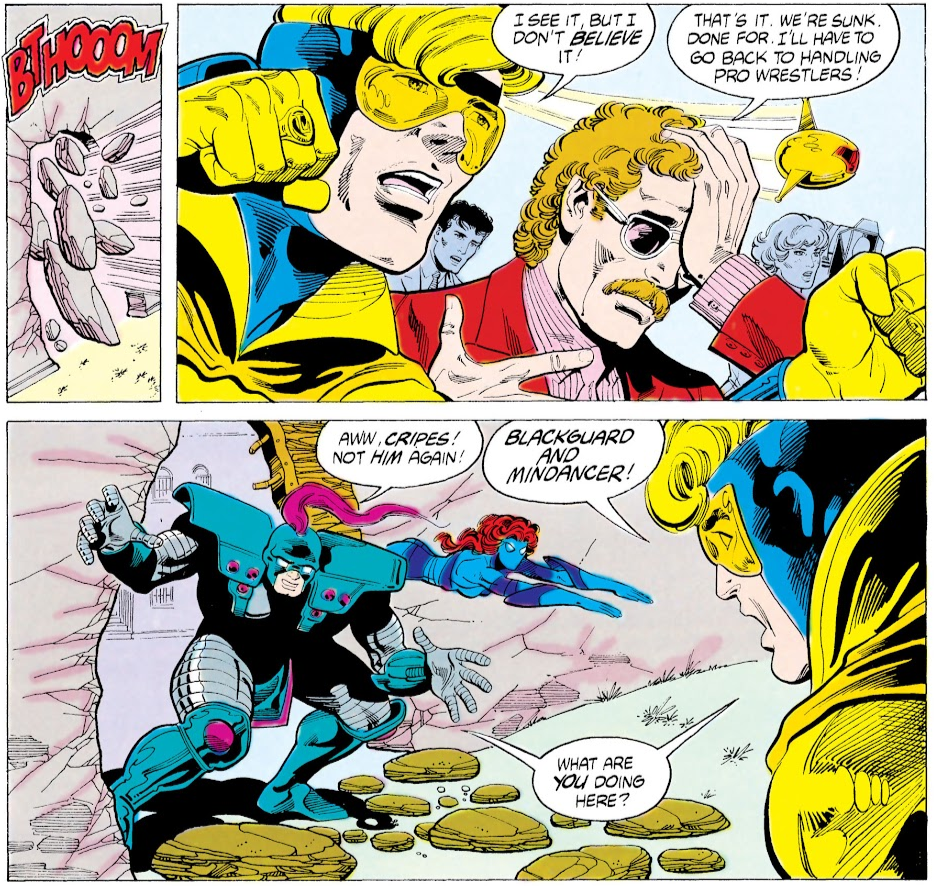
I do admit that I got a bit of a giggle at how both Booster and Blackguard responded to each other here. Gentlemen, you’ve known each other like— ten minutes! Tops! You can’t be that sick of each other yet! (Unless we’re talking about the cover, in which case you’ve known each other considerably more, uh— intimately. (ಥ_ಥ))
Ahem. Moving on—
For some reason, we jump to someone with a pretty bitchin’ cane getting a report on Booster’s fingerprints and a further report that the man apparently doesn’t exist. And, uhm—
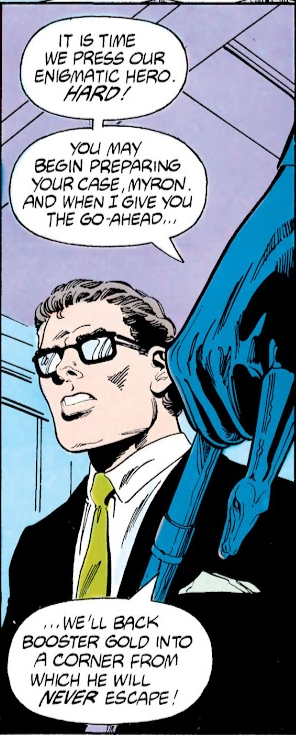
Rather than cutting back to battle, we peek in on Goldstar, Inc. where poor Trixie is inundated with everything from a sidekick wannabe to a plumber to a little old lady to— apparently the governor. While the colorful aside is vaguely amusing, and Trixie is either putting in her candidacy for sainthood or praying to some higher power for mercy, it’s much more entertaining when we get back to Booster and his new friends.
While we have some excellent writing herein and this issue is a ride, I can’t help but see innuendo literally everywhere at this point. Frankly. Which I suppose is what happens when you give someone with my sense of humor the ammunition literally from the cover of the issue.
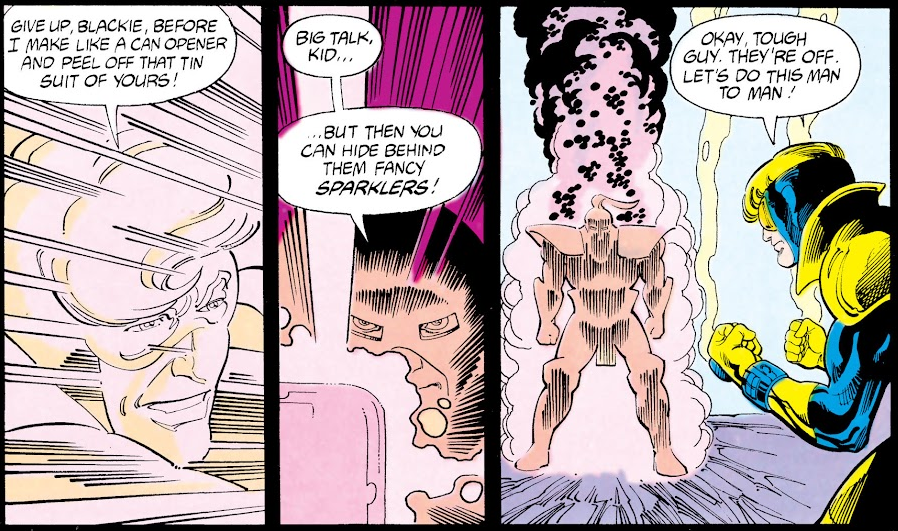
The battle commences in a slightly overwrought fashion — okay, a very overwrought fashion — wherein Booster has to dramatically discard his cape, because of course he does—
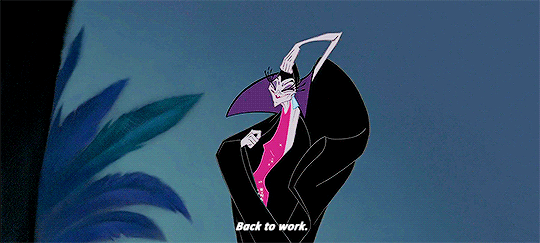
—and then he and Blackguard proceed to trade— trade blows.
🗞️(ಥ_ಥ) ← The newspaper is for you.
While I sit here embodying the Biggus Dickus sketch, bravely soldiering on, Booster finally beats Blackguard to the ground. It’s not nearly as fair a fight as the narration makes it out to be, since our boy has a forcefield whereas Blackguard does not, but that’s fine. It’s fine. We still have Mindancer to deal with, who Skeets has been keeping busy while Booster dealt with his oversized suitor opponent.
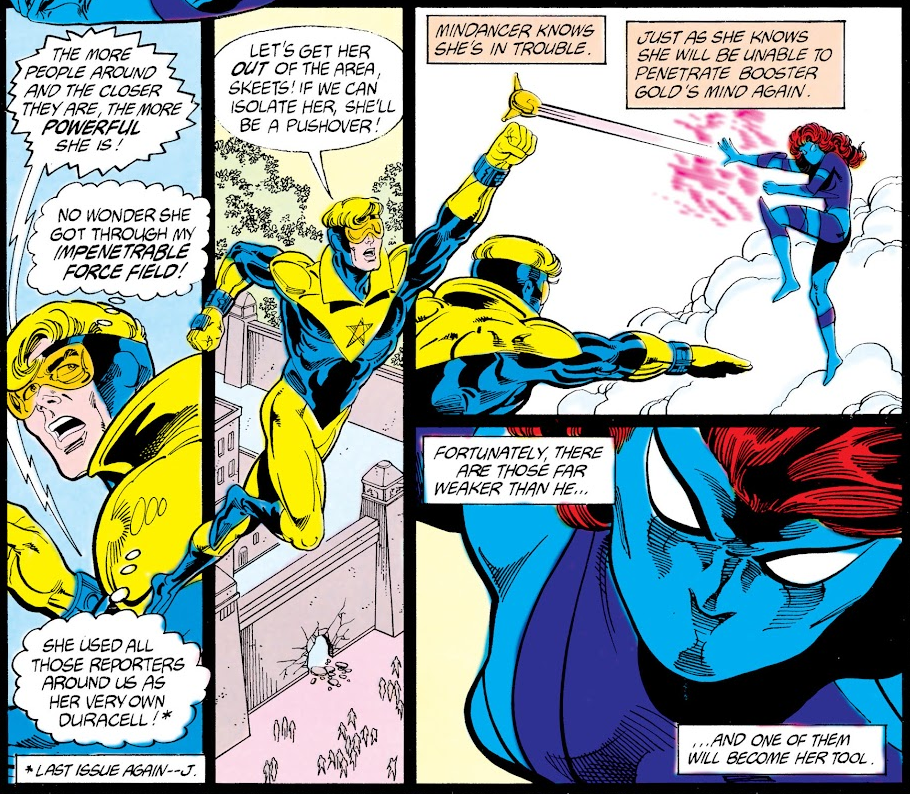
While Mindancer fails to, uh—
No, you know, I can’t. Even I have limits, apparently.
…not many limits, mind, but limits nonetheless. 🤣
Anyway, she decides to co-opt a prison guard and turn him against the film crew, necessitating Booster intervening. And while our boy’s busy saving the film crew 5, Blackguard takes it upon himself to aim at destroying something that actually would hurt Booster: Skeets.
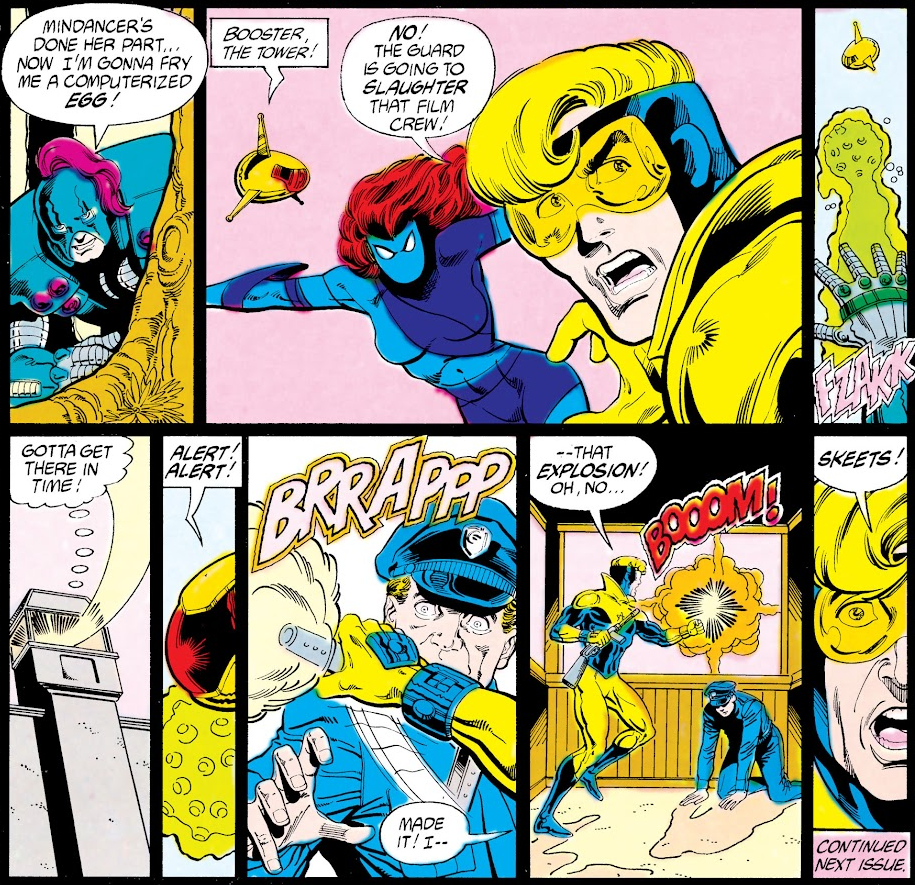
It’s quite a cliffhanger; unlike Booster, you the reader couldn’t have necessarily assumed Skeets would have survived. And Booster’s absolutely shocked reaction is entirely appropriate, especially after those earlier scenes; there is no way at all to deny that Booster trusts precisely no one entirely in this time yet aside from Skeets, and losing his ‘bot would leave him so profoundly alone that it’s a little chilling to contemplate.
That being said, there is something almost soap-opera about the way these plots run in this book, I gotta admit.
So, that’s the issue. Despite my absolute inability to resist several off-color jokes that practically tell themselves, this really is an excellent issue when it comes to digging more into who Booster is. And his dynamic with Skeets, which — as I mentioned — is one of my favorites. We got through the entire thing and I didn’t want to slap him silly once, which is pretty damn decent for only the second issue (mind, it doesn’t hold 🤣), and instead we finally get more than just glances past Booster’s rather opaque public persona.
And what we find is, instead of a major self-confident celebrity, glamorous and untouchable— behind closed doors, with his single only confidant, he’s honestly just a pretty mixed up, lonely kid whose ability to bullshit the public is really only an apparent extension on his ability to bullshit himself.
And if that’s not relatable, then I don’t know what is.
Walter rates this one — surprisingly to me! — ⭐⭐⭐⭐ out of five stars. If I were doing star ratings myself, I’d actually give this one the full five, particularly for that set of scenes where Booster and Dirk butt heads and then after where Booster and Skeets talk and we start getting a look past the mask our hero shows the world. But we both do seem to agree that Dan does some very good writing in this particular issue, and even for some of the same reasons.
The Final Tally
Urge to Slap Booster Silly: 4
Urge to Coo Over Booster: 5
Give Skeets a Medal: 5
Give Trixie a Medal: 4
Booster in Bondage: 1
Urge to Wrap Booster in Soft Blankets: 2
Tune in soon for Captain Marvel Adventures #66, aka Holy Shit, Did You Know Fawcett Comics Was Capable of That??, and after that, the review for Blue Beetle (1986) #3!
If you want the decidedly more hilarious, very queer, impromptu and somewhat NSFW reaction to this cover by myself and co-conspirator Dara, please head on over to this post. (Seriously, though, it is off-color, consider yourself fairly warned.) ↩
I used to hide under the coffee table in my nightgown to watch it late at night as my father did. Hell if I understood a single thing going on; the point was not the show, but the hiding under the coffee table. ↩
We’re gonna go ahead and count serious physical restraint by another person/lifeform with the bondage, rather than just the classical ‘tied up’ variety, because he ends up wrapped up in tentacles of more than one variety just in this volume alone. Not counting later appearances, because it happens there, too. ↩
I’m aware that not everyone agrees with that read, but I’ve got a few reams of things I can point to for my rationale for it anyway. And discussing that interpretation is not the purpose of this review, though I may well discuss it adjacent to said review because again— reams. But just like shipping him and Ted like the USPS, I’m probably gonna mention it occasionally and the same fact applies here as does to that: I’m queer, it’s 2025 and he’s explicitly, canonically queer in one official timeline already anyway. ↩
By an actual miracle, I resisted making a ‘grabbing a barrel of a gun’ joke in this moment. But I did not resist making a footnote. ↩
